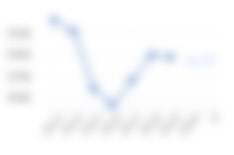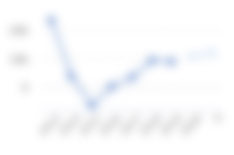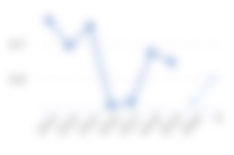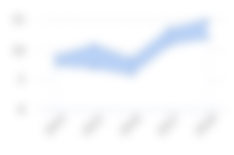11 — Hang Seng Bank Share Price
- HK$288.99bn
- HK$223.63bn
- HK$50.08bn
Growth & Value
| 12m Forecast Rolling | Industry | Market | |
|---|---|---|---|
| PE Ratio (f) | 17.59 | ||
| PEG Ratio (f) | 1.05 | ||
| EPS Growth (f) | 20.15% | ||
| Dividend Yield (f) | 4.64% | ||
| Valuation (ttm) | Industry | Market | |
|---|---|---|---|
| Price to Book Value | 1.69 | ||
| Price to Tang. Book | 1.74 | ||
| Price to Free Cashflow | 2.53 | ||
| Price to Sales | 4.96 | ||
| EV to EBITDA | 70.28 | ||
Shareholder Activity
| Type | Buy / Hold / Sell |
|---|---|
| Institutions | |
| Directors | |
| Community |
Guru Screens
Quality
| Name | Industry | Market | |
|---|---|---|---|
| Return on Capital | 0.98% | ||
| Return on Equity | 8.52% | ||
| Operating Margin | 30.59% | ||
Financial Summary
| Year End 31st Dec | Unit | 2020 | 2021 | 2022 | 2023 | 2024 | 2025E | 2026E | CAGR / Avg |
|---|---|---|---|---|---|---|---|---|---|
| Total Revenue | HK$m | 23,017 | 21,875 | 35,429 | 54,756 | 50,076 | 41,175.96 | 41,795.19 | 10.29% |
| Operating Profit | m | ||||||||
| Net Profit | m | ||||||||
| EPS Reported | |||||||||
| Diluted Normalised EPS | |||||||||
| EPS Growth | % | -32.19 | -19.99 | -19.02 | +60.29 | +6.72 | -23.91 | +20.15 | n/a |
| PE Ratio | x | ||||||||
| PEG | |||||||||
| Profitability | |||||||||
| Operating Margin | % | ||||||||
| ROA | % | ||||||||
| ROCE | % | ||||||||
| ROE | % | ||||||||
| Cashflow | |||||||||
| Op. Cashflow ps | |||||||||
| Capex ps | |||||||||
| Free Cashflow ps | |||||||||
| Dividends | |||||||||
| Dividend ps | |||||||||
| Dividend Growth | % | ||||||||
| Dividend Yield | % | ||||||||
| Dividend Cover | x | ||||||||
| Balance Sheet | |||||||||
| Cash etc | m | ||||||||
| Working Capital | m | ||||||||
| NFA | m | ||||||||
| Net Debt | m | ||||||||
| Book Value | m | ||||||||
| Diluted Weighted Average Shares | m | ||||||||
| Book Value ps | |||||||||
Other Ratios
| Leverage (ttm) | Total | - Intang | + Pension |
|---|---|---|---|
| Gross Gearing | |||
| Net Gearing | |||
| Cash / Assets |
| Liquidity (ttm) | |
|---|---|
| Curr. Ratio | |
| Quick Ratio | |
| Interest Cov. | |
| Efficiency (ttm) | |
|---|---|
| Asset Turnover | |
| Recs Turnover | |
| Stock Turnover | |
Recent History
| Latest interim period vs. prior period | Industry | Market | |
|---|---|---|---|
| Sales Growth | |||
| EPS Growth | |||
| 3yr Compound Annual Growth Rate | Industry | Market | |
|---|---|---|---|
| Sales CAGR | |||
| EPS CAGR | |||
| DPS CAGR | |||
Profile Summary
Hang Seng Bank Ltd is a company mainly engaged in banking and related financial business. The Company operates its business through four segments. The Wealth Management and Personal Banking segment provides personal banking, consumer loans, time deposits, mortgage and personal loans, credit cards, insurance, as well as investment and wealth management services. The Commercial Banking segment is engaged in corporate lending, trade and receivables financing, payments and cash management, treasury and foreign exchange, distribution of non-life and key insurance, investment services, as well as corporate wealth management. The Global Banking segment provides general banking services, transaction banking, corporate credit, deposits and cash management. The Global Market segment provides foreign exchange, gold, equities, fixed income and securities financing services. The Other segment is mainly engaged in property investment, stock investment and subordinated debt financing.
Directors
- Yun Lien Lee CHM (67)
- Diana Cesar CEO
- Wing Lok Leung CFO (58)
- Yue Sheng Song CEX (47)
- Eunice Chan COO (58)
- Chee Leong Yeo CRO (51)
- Chi Chung Li GCN (56)
- Wing Han Kwan EDR (61)
- Yee Ning Wang DHR (59)
- Pui Sze Cheung OTH (41)
- Mui Cho OTH (49)
- Tan Ling Chow OTH (47)
- Yin Shing Lam OTH (57)
- Man Lung Lee OTH (43)
- Hing Keung Tsang OTH (54)
- May Kay Wong OTH (58)
- Chieh Huey Gan NED (46)
- David Liao NED
- Hong Sui Lo NED (73)
- Sing Yip Ng NED (70)
- Cho Chak Chan NID (77)
- Lai Yuen Chiang NID (55)
- King Man Kwok NID (61)
- Wei Kuo Wu NID (50)
- Last Annual
- December 31st, 2024
- Last Interim
- June 30th, 2025
- Incorporated
- December 5th, 1952
- Public Since
- June 20th, 1972
- No. of Employees
- 8,143
- Sector
- Banking Services
- Industry
- Financials
- Exchange
Stock Exchange of Hong Kong Limited
- Shares in Issue
- 1,872,937,536

- Address
- 83 Des Voeux Road Central, Central
- Web
- https://www.hangseng.com/
- Phone
- +852 null34789216
- Auditors
- PricewaterhouseCoopers
Upcoming Events for 11
Hang Seng Bank Ltd Annual Shareholders Meeting
Similar to 11
Agricultural Bank of China
Stock Exchange of Hong Kong Limited
Aeon Credit Service Asia Co
Stock Exchange of Hong Kong Limited
Allied
Stock Exchange of Hong Kong Limited
Alliance International Education Leasing Holdings
Stock Exchange of Hong Kong Limited
Amasse Capital Holdings
Stock Exchange of Hong Kong Limited
FAQ
As of Today at 20:01 UTC, shares in Hang Seng Bank are trading at HK$154.30. This share price information is delayed by 15 minutes.
Shares in Hang Seng Bank last closed at HK$154.30 and the price had moved by +66.72% over the past 365 days. In terms of relative price strength the Hang Seng Bank share price has outperformed the FTSE Developed Asia Pacific Index by +17.3% over the past year.
The overall consensus recommendation for Hang Seng Bank is Hold. You can view the full broker recommendation list by unlocking its StockReport.
Find out moreThe Hang Seng Bank dividend yield is 4.54% based on the trailing twelve month period.
Last year, Hang Seng Bank paid a total dividend of HK$7.00, and it currently has a trailing dividend yield of 4.54%. We do not have any data on when Hang Seng Bank is to next pay dividends.
We do not have data on when Hang Seng Bank is to next pay dividends. The historic dividend yield on Hang Seng Bank shares is currently 4.54%.
To buy shares in Hang Seng Bank you'll need a share-dealing account with an online or offline stock broker. Once you have opened your account and transferred funds into it, you'll be able to search and select shares to buy and sell. You can use Stockopedia’s share research software to help you find the the kinds of shares that suit your investment strategy and objectives.
As of the previous close price of HK$154.30, shares in Hang Seng Bank had a market capitalisation of HK$288.99bn.
Here are the trading details for Hang Seng Bank:
- Country of listing: Hong Kong
- Exchange: HKG
- Ticker Symbol: 11
Based on an overall assessment of its quality, value and momentum Hang Seng Bank is currently classified as a . The classification is based on a composite score that examines a wide range of fundamental and technical measures. Stock are classified on the the following spectrum: Super Stocks, High Flyers, Contrarians, Turnarounds, Neutral, Value Traps, Momentum Traps, Falling Stars, and Sucker Stocks. For more information, learn about our StockRank Styles.
The analyst consensus target price for shares in Hang Seng Bank is HK$109.48. That is 29.05% below the last closing price of HK$154.30.
Analysts covering Hang Seng Bank currently have a consensus Earnings Per Share (EPS) forecast of HK$7.30 for the next financial year.
Find out moreAn important predictor of whether a stock price will go up is its track record of momentum. Price trends tend to persist, so it's worth looking at them when it comes to a share like Hang Seng Bank. Over the past six months, its share price has outperformed the FTSE Developed Asia Pacific Index by +3.81%.
As of the last closing price of HK$154.30, shares in Hang Seng Bank were trading +22.43% higher than their 200 day moving average. You can read more about the power of momentum in assessing share price movements on Stockopedia.
The Hang Seng Bank PE ratio based on its reported earnings over the past 12 months is 17.59. The shares last closed at HK$154.30.
The PE ratio (or price-to-earnings ratio) is the one of the most popular valuation measures used by stock market investors. It is calculated by dividing a company's price per share by its earnings per share.
The PE ratio can be seen as being expressed in years, in the sense that it shows the number of years of earnings which would be required to pay back the purchase price, ignoring inflation. So in general terms, the higher the PE, the more expensive the stock is.
Hang Seng Bank's management team is headed by:
- Yun Lien Lee - CHM
- Diana Cesar - CEO
- Wing Lok Leung - CFO
- Yue Sheng Song - CEX
- Eunice Chan - COO
- Chee Leong Yeo - CRO
- Chi Chung Li - GCN
- Wing Han Kwan - EDR
- Yee Ning Wang - DHR
- Pui Sze Cheung - OTH
- Mui Cho - OTH
- Tan Ling Chow - OTH
- Yin Shing Lam - OTH
- Man Lung Lee - OTH
- Hing Keung Tsang - OTH
- May Kay Wong - OTH
- Chieh Huey Gan - NED
- David Liao - NED
- Hong Sui Lo - NED
- Sing Yip Ng - NED
- Cho Chak Chan - NID
- Lai Yuen Chiang - NID
- King Man Kwok - NID
- Wei Kuo Wu - NID





